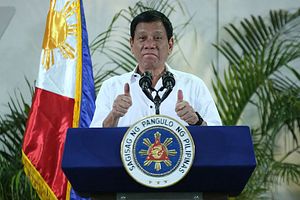The Philippine president has said he accepts responsibility for the thousands of killings committed during police operations in his crackdown on drugs, adding that he was even ready to go to jail.
President Rodrigo Duterte’s televised remarks Monday night were typical of his bluster — and tempered by the fact that he has pulled his country out of the International Criminal Court, where a prosecutor is considering complaints related to the leader’s bloody campaign.
The remarks were also a clear acknowledgement that Duterte could face a deluge of criminal charges. Nearly 6,000 killings of drug suspects have been reported by police since he took office in mid-2016, but rights watchdogs suspect the death toll is far larger.
“If there’s killing there, I’m saying I’m the one … you can hold me responsible for anything, any death that has occurred in the execution of the drug war,” Duterte said.
“If you get killed, it’s because I’m enraged by drugs,” said the president known for his coarse and boastful rhetoric. “If I serve my country by going to jail, gladly.”
He said, however, that drug killings that did not happen during police operations should not be blamed on him, alleging that those may have been committed by gangs.
Duterte has made a crackdown on drugs a centerpiece of his presidency. At the height of the campaign — which has often targeted petty dealers and users along with a handful of the biggest druglords — images of suspects sprawled dead and bloodied in the streets were frequently broadcast in TV news reports and splashed on the front pages of newspapers. Tens of thousands of arrests in the initial years of the crackdown worsened congestion in what were already among the world’s most overcrowded jails.
U.N. human rights experts and Western governments led by the United States have raised alarm over the killings, enraging Duterte, who once told former U.S. President Barack Obama to “go to hell.”
There have been widespread suspicions that police engage in extrajudicial killings in the crackdown, allegations that they and Duterte deny. In 2018, a court convicted three police officers of murdering a 17-year-old student after witnesses and a security video disproved their claim that the suspect was shot after violently resisting, a common reason cited by police officers after drug suspects are killed.
At least two complaints for crimes against humanity and mass murder in connection with Duterte’s campaign are being examined by an ICC prosecutor, who will determine whether there is enough evidence to open a full-scale investigation.
When the complaints were made, Duterte withdrew the Philippines from the world tribunal two years ago in a move that human rights groups said was a major setback in the country’s battle against impunity. The ICC prosecutor has said the examination into the drug killings would continue despite the Philippine withdrawal.
Duterte reiterated his defiance of the court’s probe Monday by asking, when did “drugs become humanity?”
Instead, he framed the drug menace as a national security threat, as he has in the past, comparing it to the communist insurgency that the government has tried to quell for more than a half-century.
“If this is allowed to go on and on and if no decisive action is taken against them, it will endanger the security of the state,” said Duterte, a former government prosecutor.
“When you save your country from the perdition of the people like the NPAs and drugs, you are doing a sacred duty,” he said, referring to communist New People’s Army insurgents.
Police have reported at least 5,856 drug suspects have been killed in raids and more than 256,000 others arrested since the start of the crackdown. Human rights groups have accused authorities of considerably under reporting the deaths.
By Jim Gomez for the Associated Press in Manila, Philippines.

































